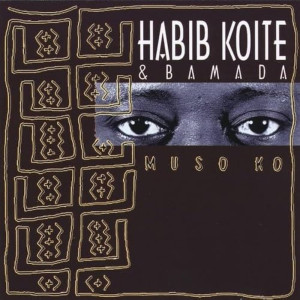 Patrick O’Donnell wrote this review.
Patrick O’Donnell wrote this review.
Habib Koite’s rich guitar playing and complex, poetic lyrics make Muso Ko an album of literary proportions. Throughout the 16 tracks, the immensely talented Koite tackles prostitution, work ethics and morals, politics, the dangers of cigarettes, and the respect and welfare of children. A Herculean effort, but one that the Senegal native tackles with ease, all the while making music that’s as listenable as it is danceable.
Koite (guitar and lead vocals) and his band, Bamada — Souleymane Ann on percussion and vocals; Baba Sissoko on taman-ba, balafon, talking drum and cragnan; Abdoul Wahab Berthe on bass; Boubacar Sidibe on guitar, harmonica and vocals; and Sidiki Camara on djembe and barra — released Muso Ko, the band’s first CD, in 1997. They followed that success with Ma Ya on the Virgin label in 1998. Since then, the band has been earning a good name for itself in the ever-growing genre that is world music.
The 41-year-old got his start playing the guitar at the feet of his mother, a Malian griot, or tribal storyteller. His grandfather played the “ngoni,” a traditional four-stringed instrument played by hunters in the Malian province of Wassolou and provided the inspiration for the unique sound Koite coaxes from his guitar. His playing style is a hybrid; flamenco, jazz and the sound of the ngoni can all be heard. His writing is just as diverse. Koite assumes the role of poet, storyteller, and lyricist. Even in translation, Koite’s words retain their poetry. Take the lyrics to Muso Ko’s fourth track, “Nanale (The Swallow)”:
This hunter is a hunter of men.
They have left the great bush
To settle in the great cities
Because in the great cities, there is
wonderful game to be found:
A little body, light and white.
“The Swallow” juxtaposes the beautiful and the ugly; the tame and the wild; the hunter and the hunted. It’s a haunting look at the tolls prostitution takes on the women who practice it, the men who seek it out and the society that permits it. Koite paints a picture that takes the listener into the streets to walk with the darkness that feeds there.
But Muso Ko isn’t all bleak. “I Ka Barra (Your Work)” is about the inspiration of hard work and its payoffs, which — as the song points out in a lesson the Western world would do well to heed — are not always in money.
Work, knowing the sun can’t shine everyday And love what you do.
Get up early and tighten your belt.
If the doctor wasn’t patient, the patient wouldn’t live long.
If the mechanic wasn’t patient, cars wouldn’t last long.
If the kettle maker wasn’t patient, what would we cook in?
All right! To each man a job to do.
The disc is almost entirely in Malian, but Koite overcomes the language barrier through the intricate rhythms he builds with guitar and percussion. The blend of western instrumentation — electric bass, harmonica, guitar — and the traditional African instruments — djembe, talking drum, balafon, cragnan, taman-ba and barra — work to make the listener comfortable through a feeling of familiarity. At the same time, it transports the listener to another society, a society whose problems aren’t all that different from our own.
Muso Ko is a sweeping vista of the breathtaking mountains and grasslands and a harsh look at smoke-belching cities teeming with prostitution and disease, a disease of the soul as much as it is of the body. It’s hope with a harsh does of reality.
(Alula, 1997)
